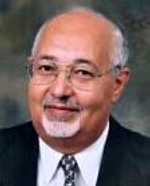Professor Mamoun Muhammed
The CNN article Nanotechnology could cool the heat from server farms said
“The internet may soon be a greener place thanks to new research that looks set to slash the carbon footprint of our surfing by introducing nanotechnology to computer servers.Computer servers are often housed in giant warehouses, known as ‘server farms’ and generate huge amounts of heat, which in turn requires huge amounts of power to fuel cooling systems.
Researchers from Sweden’s Institute of Technology have discovered that adding some nanoparticles to water can improve its ability to conduct heat by around 60 percent. This nanofluid could then be used in cooling computer servers and reduce the total amount of energy needed to keep temperatures down.
‘We have had some really significant successes,’ Mamoun Muhammed, Sweden’s Institute of Technology, told CNN.”
Mamoun Muhammed, Ph.D. is Chairman, Functional Materials Division, and Director, Nano Characterization Centre, Royal Institute of Technology (KTH), Sweden.
Mamoun has been at the Royal Institute of Technology since 1969 in different positions and earned his Ph.D. there in Inorganic Chemistry in 1975. He earned his B.Sc. degree in Chemistry and Applied Chemistry from Cairo University, Egypt in 1967.
He has published 8 books and book chapters and over 200 papers. He has over 250 conference and seminar presentations and more than 60 plenary, keynote, and invited talks. He is the cofounder of two spinoff companies for the commercialization of his research results.
Mamoun coauthored Nanophase catalytic oxides: I. Synthesis of doped cerium oxides as oxygen storage promoters, Synthesis of zinc oxide nanoparticles with controlled morphology, Differences in the Magnetic Properties of Co, Fe, and Ni 250–300 nm Wide Nanowires Electrodeposited in Amorphous Alumina Templates, Processing of nanostructured WC-Co powder from precursor obtained by co-precipitation, and The Importance of an Endotoxin-Free Environment during the Production of Nanoparticles Used in Medical Applications.
Mamoun also has more than 20 patents and patent applications, several of which have been filed in different European countries and the USA. He has been a visiting professor in Spain, Italy, Korea, Albania, China, USA and Egypt, and he is active in several national and international organizations.
His patents include Conductive polymers containing zinc oxide particles as additives, Antistatic fibers, Topical ultra-violet radiation protectants, Method of making metal composite powder, Method of preparing powders for hard materials from cobalt salts and soluble tungstate salts, and Oxygen storage material, process for its preparation and its application in a catalyst.
